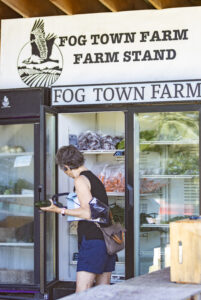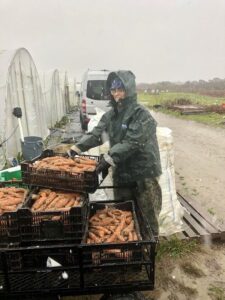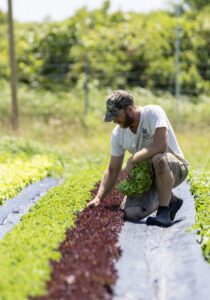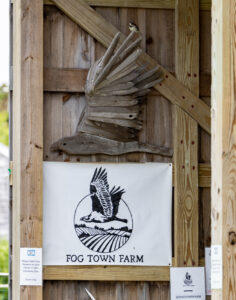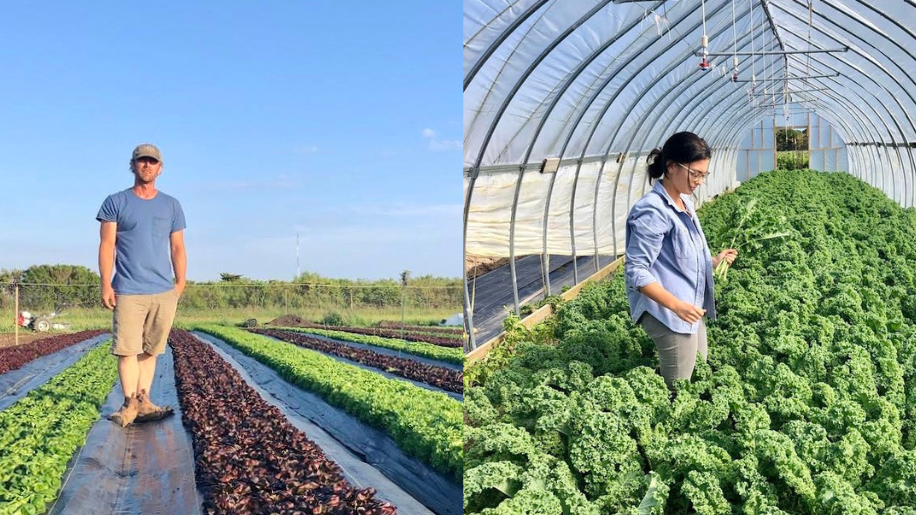Aidan and Natasha Feeney own and operate Fog Town Farm, which was established in 2019 and is located on the Sustainable Nantucket campus at Mount Vernon Farm. Prior to founding Fog Town Farm, both graduated from Sterling College in Vermont with bachelor’s degrees in Sustainable Agriculture, but their appreciation for the outdoors and locally grown food began long before then. Aidan grew up on Nantucket, and always possessed a love of nature, surfing, and fishing. After graduating college in 2013, he became the vegetable manager at Karl Family Farm in the Hudson Valley, then managed over 15 acres of vegetables, peaches, and berry crops at Youngs Farm on Long Island. Natasha grew up on Long Island and spent her summers with family in Croatia where backyard gardens were the norm. During her time in college, she spent 10 months WWOOFing in Europe, working on farms in Ireland, the Netherlands, Serbia, Croatia, and Italy. She graduated in 2012 and worked at a number of farms including a wholesale flower farm, Karl Family Farm, and Orkestai Farm. Natasha has a Bachelor of Science in nursing, and she is now on track to get a master’s degree to become a Nurse Practitioner this year (she currently works part time as a registered nurse at Nantucket Cottage Hospital). Today, this couple runs Fog Town Farm together, so we sat down with them to ask some questions!
What do you grow on your farm?
Aidan: If it can be in a salad, chances are we grow it. It’s mostly a lot of salad greens, cucumbers, zucchini, tomatoes, and sweet peppers. We also grow a lot of root crops, like carrots, beets, radishes, and turnips. And we always try to offer at least one allium at different times of the year, so that could be fresh bunches of scallions, cured onions, or leeks. What else Tash?
Natasha: Watermelon.
Aidan: Yeah, we do watermelon…. that’s more of a passion [laughs].
Natasha: He eats about 4 a day [laughs].
What’s your favorite crop?
Natasha: I really enjoy doing greenhouse work with tomatoes. Trellising and pruning. It’s an art and it’s really satisfying. I think my favorite vegetable to eat is some sort of allium. Onions on everything!
Where can people buy your food?
Aidan: We sell retail at the farm stand at 168 Hummock Pond Road, at country clubs, and at a lot of the restaurants downtown. We’re at the Farmer’s Market every Saturday, and we sell at all the independent grocers on the island.
What are your top sellers?
Aidan: People love our winter carrots.
Natasha: Carrots get sweeter after they’ve been in the ground when it freezes.
Aidan: I get all types of people telling me “I have to lie to my kids and tell them that every carrot is from you because they only like your carrots”.
Where did the name Fog Town Farm come from?
Aidan: Growing up on Nantucket, me and my friends were obsessed with surfing and skateboarding. There was a group of surfers and skateboarders in California that went by [the name] Dogtown. Back when we were little kids, we thought it was funny calling ourselves fog town, so I did it as an homage to that, and you know it gets foggy here!
Why are you interested in farming here on Nantucket?
Aidan: I grew up here, so it’s really cool being able to come back with this new way to contribute, and seeing all these people that I grew up with at the Farmer’s Market, whether they’re schoolteachers or friends and family. Now I get to bring [this new skill] back to the community I grew up with and have this contribution. That’s been very rewarding.
How does farming benefit the community?
Aidan: Farming, when it’s done in a good way, is aesthetically pleasing, and the food tastes better than shipped food. So, from the most basic standpoint, it’s a benefit to the community in the fact that they get to be around something beautiful and get fresh produce off it. But also, when you go to some of these places in Europe where small farming has remained a way of life for a long time, I think that’s the root of culture. That’s why we think about wine in France, and we think about olives in Greece. I think the essence of culture comes from the farms and people’s relationship to the land and that’s how different cuisines are determined over time. As an American, what I’m really interested in is having a renaissance of that and seeing how these different areas figure out which crops grow well there, and what the customers like to eat. There’s a multi-generational aspect, and that’s how local food culture is developed. I get excited about local farms making it so New England has more of a unique cuisine than the rest of America over time.
What makes your farm environmentally friendly?
Natasha: At the farm, all the inputs are certified organic. We’re not using any synthetic herbicides, pesticides, insecticides, fungicides, or fertilizers.
Aidan: It’s all organic in practice. I got into agriculture more from an interest in nature to begin with so that’s paramount to what we do.
Is there anything else you want to share?
Aidan: We just want to thank all the people who have helped us, whether that’s Sustainable Nantucket, the Land Bank, or all our customers and the chefs. Part of the reason that we were able to make this work is the fact that people wanted to see more agriculture here, so we just feel really lucky that we’ve had that support; for example, the farm stand built by Posie, and all the local families that go there. Our core clientele are year round local people, namely the moms going to shop for their kids. I just want to express gratitude to all those people.
Natasha: They’re the reason we’re successful!
Aidan: Oh, and we have a cute dog – Ruby!
Natasha: She’s 4 years old. We bring her to the Farmer’s Market every week, and we have customers who buy bags of dog treats for her. It’s their weekly thing. She has a whole fan club!
